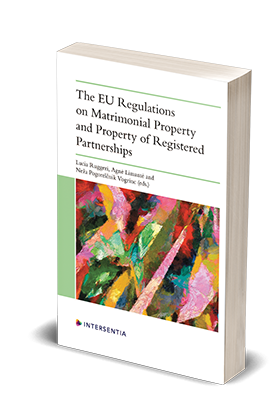| Interview |
Authors speaking: Lucia Ruggeri, Agne Limante, Neža Pogorelcnik Vogrinc about their publication The EU Regulations on Matrimonial Property and Property of Registered Partnerships


LUCIA RUGGERI is an author and an editor of numerous publications. She was the coordinator of the EU Project “Personalized Solution in European Family and Succession Law – PSEFS”. At the moment, she is the coordinator of the EU Project “E-training on EU Family Property Regimes – EU-FamPro”.


AGNĖ LIMANTĖ has a number of publications in the field of private international family law. She is actively engaged in international research projects. Recently, she took part in several EU co-founded projects that were designed to train judges, lawyers and social services on private international family law instruments.


NEŽA POGORELČNIK VOGRINC has published several papers in national and foreign journals, is and author of the individual chapters of ten books and a sole author of the book “Začasne odredbe v civilnih sodnih postopkih” (Provisional measures in civil court procedures). She is a researcher at the three national and three European projects in the field of civil and European law.
To start from the beginning, what is a cross-border couple?
Agnė Limantė: When we use the term ‘cross-border couples’, we mean couples where the spouses or partners are of different nationalities or where the spouses or partners hold the same nationality but live in another country than that of their origin. It can also be a couple whose members live in different countries – or, as we say, have their habitual residences in different states.
In the EU, such couples are very common. Because of the free movement of people in the EU, millions of people live in countries other than their nationality, working or studying there and – naturally – falling in love.
What are the legal challenges involved in these increasingly numerous partnerships?
Agnė Limantė: Cross-border couples benefit from linguistic and cultural diversity, allowing them to live and raise children in a multi-cultural environment. However, they also face various challenges, including practical dilemmas and misunderstandings due to cultural differences.
From the legal perspective, the set of legal rules regulating different aspects of a cross-border relationship is much more extensive and complicated than that regulating the situation of a single nationality couple living in its home country. Often, in the family law field, national laws of several countries might come into play, raising many questions for the couples. This becomes particularly sensitive in case of a possible break-up – the couples have many doubts as to where the divorce should take place, under which law and in which court parental responsibilities should be settled, what law would apply to their matrimonial property, etc.
What instruments does the EU have?
Neža Pogorelčnik Vogrinc: TFEU in its Article 81(3) provides for a legal basis for the EU instruments in the area of family law. On this basis, the EU has adopted a number of private international law instruments over the last two decades to deal with issues arising from the cross-border movement of families. These are Brussels II bis Recast Regulation regulating jurisdiction and the recognition and enforcement of judgments in matrimonial and parental responsibility matters, the Rome III Regulation setting out the rules on the applicable law to divorce and legal separation, the Maintenance Regulation, the Matrimonial Property Regulation and the Regulation on the Property Consequences of Registered Partnerships.
This book explains two of them.
Neža Pogorelčnik Vogrinc: Yes, the book focuses on Matrimonial Property Regulation and the Regulation on the Property Consequences of Registered Partnerships, together also known as the “Twin Regulations”, which apply from 29 January 2019. As can be imagined, the property regime and related property issues are of a huge importance in the event of divorce, legal separation, marriage annulment, or dissolution and annulment of the registered partnership. Thus, the need for European rules in this area has been great. The Twin Regulations therefore set out rules regarding jurisdiction, applicable law and the recognition and enforcement of decisions in matters of matrimonial property regimes and in matters of the property consequences of registered partnerships.
Are they enough?
Lucia Ruggeri: The regulatory framework offered by European Union for cross-border couples could be considered a “work in progress”. We need better coordination between the EU instruments and in our book the authors developed an interpretation of the “Twin Regulations” to facilitate the interplay with the EU instruments dedicated to Family and Succession Law. But we also need more uniformity on the grounds of land registers and family registers. The relationships between cross-border couples and third parties will be easier in the future if the EU can offer a transparent and coordinated real estate system.
What are the challenges for the future?
Lucia Ruggeri: At the domestic level during the last decade in several EU Countries the legal definition of marriage, separation and divorce has changed, new needs have emerged, and the composition of the European Union is also varied. So, when we apply the “Twin Regulations” we need to check this evolution in the legal system involved. But the most important challenge could be considered to overcome the fragmentation: after the season of the unanimity only 18 EU Countries participated in the enhanced cooperation for the EU Regulations 1103 and 1104/2016. In this sense, the sunset of the unanimity could be considered a “litmus paper” of the European Union situation.
About the book


The EU Regulations on Matrimonial Property and Property of Registered Partnerships
This volume contributes to the literature on private international family law in Europe through the examination of two recent EU instruments: the Matrimonial Property Regulation and the Regulation on the Property Consequences of Registered Partnerships. The book presents the two regulations in a clear and comprehensive manner and analyses their implications for EU family law going forward.
Lucia Ruggeri, Agne Limante, Neža Pogorelcnik Vogrinc
February 2022
ISBN 97817839701993